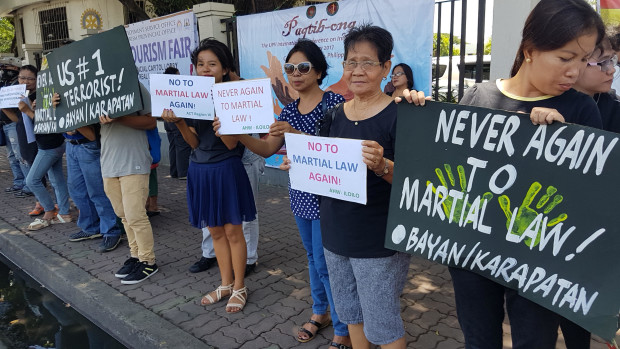SC urged to protect public from arbitrary declaration of martial law

Protesters in Iloilo City call for the lifting of martial law, warning of abuses and human rights violations (Photo by NESTOR P. BURGOS / Inquirer Visayas)
Anti-martial law petitioners urged the Supreme Court on Monday to stand its ground and safeguard the public’s fundamental liberties against “whimsical or arbitrary imposition of martial law.”
“In this difficult task of resolving the present dispute and balancing the conflicting interests, we implore the Court to safeguard the people’s fundamental liberties, and ensure that the government’s vast powers are utilized only for the benefit of the people for which it serves,” the 66-page memorandum filed by four Marawi City residents through counsel Marlon J. Manuel reads.
“In deciding this case, the Honorable Court is called upon to rule on the two fundamental doctrines of republic government–the doctrine of separation of powers and the doctrine of checks and balances,” the same memorandum stated.
There are three consolidated petitions asking the high court to nullify Proclamation 216 or President Rodrigo Duterte’s 60-day martial law in the entire Mindanao. All parties—petitioners and respondent, the government through the Office of the Solicitor General have been required to submit their respective memoranda today (Monday) containing all the arguments they have raised during the oral argument and their response to the matters which the justices required them to clarify.
Petitioners, in their petition as well as during the three-day oral argument, expressed fear that the grave acts and atrocities committed during the martial law of former President Ferdinand Marcos will be repeated during Duterte’s martial law.
“While it is the position of Respondents that our current President’s declaration will be nothing like the Marcos martial law, statements by the Commander-in-Chief, even assuming they are made in jest, contradict this empty assurance. For it is not true that days after Martial Law has been declared, the President unwittingly said that soldiers can rape women under martial law,” the petitioners added.
For the other group of petitioners led by National Union of Peoples’ Lawyers and its chairperson Neri J. Colmenares, they said that the 1987 Constitution requires Congress to hold a joint session to either revoke or approve Mr. Duterte’s proclamation, adding: “This is a checks-and-balance provision installed to regulate the unilateral power of the President to impose martial law or suspend the privilege of the writ of habeas corpus.”
“The Constitution provided safeguards against the whimsical or arbitrary imposition of martial law which has caused so much misery and death in 1972,” their 53-paged petition reads.
“The 1987 Constitution, both in spirit and in its express provisions, substantially regulated the exercise of presidential powers of declaring martial law and suspending the privilege of the writ of habeas corpus. Behind this regulation is the intent to avoid a recurrence of the legislative and judicial inaction to check the imposition of martial law government under then President Ferdinand Marcos,” their memorandum further reads.
On the other hand, members of the minority bloc from Congress led by Albay Representative Edcel C. Lagman said that there is no need for the declaration of martial law to subdue the terrorist.
Petitioners insist that martial law is only the last resort for the government if other measures failed. They maintained that the first among the possible measures that can be taken by the government is the calling out power by the President for the Armed Forces of the Philippines (AFP) and the Philippine National Police (PNP) to suppress lawless violence. If it fails, the next measure is the suspension of the privilege of the writ of habeas corpus. If it again fails, only then can the President declare martial law.
“However, confronting and defeating them does not need the imposition of martial law where there is no actual “invasion or rebellion” when the public safety requires such imposition or suspension and when there is no sufficient factual basis for the same,” Lagman said in their 38-page memorandum.
“The exercise of powers of both the President and the Armed Forces of the Philippines when martial law is declared or the writ is suspended is reined in and delimited by the multiple safeguards enshrined in the 1987 Constitution to prevent the repetition of the misuse and abuse of such declaration or suspension together with attendant excesses, repression and atrocities reminiscent of the 14 ignominious years of martial law under the late President Ferdinand Marcos,” Lagman added.
After the submission of the memoranda, the SC deems the case submitted for resolution. The high court, under the Constitution, is required to rule on the petitions 30 days since its filing, which falls on July 5